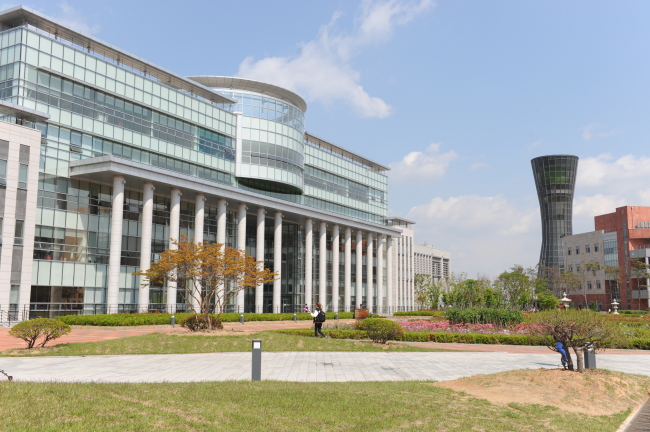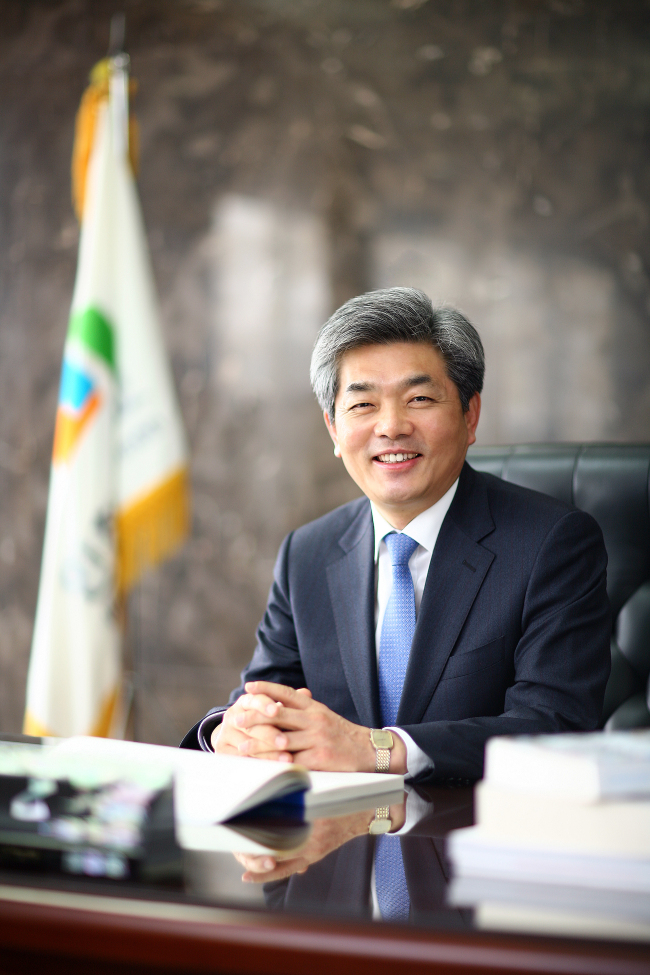In 2009, Incheon National University moved from its old home in Nam-gu, Incheon, to Songdo International City, located in the city often cited as the “doorsteps to Korea.” It was a move in keeping with the school’s goal of achieving “Glocality,” a combination of “global” and “local” within the campus.
INU has set the China Project and “Becoming the key university of creative city Incheon” as its specialized strategy. Through these goals, it aims to propel itself as a flagship university of the Incheon region, and ultimately of Northeast Asia,” university officials said. The school’s education system centers on fostering and enhancing the five key abilities ― creativity, problem-solving, communication, leadership and global competence ― of its students.
 |
Incheon National University |
For starters, INU said it seeks to become one of the flagship national universities in Korea, along with Kyungpook National University, Pusan National University, Chonbuk National University and Chonnam National University, by 2020. The Korean government designates some state-run higher education institutes as universities based on their competence. These institutes act as leaders of education in their respective regions and enjoy more government subsidies.
One of the focal points of its plans to expand is its China Project, through which it aims to educate specialists in Chinese studies. Taking advantage of its position, next door to the world’s second-biggest economy, it recently launched the Academy of Chinese Studies.
The academy is a culmination of Chinese-related studies within the INU, and an open place to provide and share information on China. It features two research centers about the country ― the Institute for Chinese and Overseas Chinese Culture, and the Institute of Chinese Studies. It also conducts in-depth studies on Chinese people living overseas, particularly those residing in Incheon, home to the biggest and oldest Chinatown in Korea.
The academy seeks to find appropriate responses to China’s further rise to prominence in Asia, by studying its culture, people and society, according to officials. In addition, it plans to launch various programs to share its findings with citizens.
“The Academy of Chinese Studies will contribute to the business, economy, culture and education of the (Incheon) region, We can expect synergy as the academy will link the existing education projects with new ones, propelling Incheon National University as the key institutes in Chinese studies,” said INU president Choi Sung-eul.
 |
Choi Sung-eul, president of Incheon National University |
The China Project and flagship university initiative are the key elements of the “INU Vision 2020” that aims to put INU on the map. Its efforts to boost its competence have been recognized by the government, as it was selected in July for the Education Ministry’s “University for Creative Korea” or CK project.
The CK project focuses on encouraging universities across the country to develop their specialties depending on the region they are based in. As one of the 10 universities in the Incheon and Gyeonggi Province to receive government subsidies, INU will receive a total of 15.5 billion won ($14 million) over the next five years.
The primary objective of the INU in the CK project is to foster talented individuals who can work in international work environments. This is motivated by the fact that the school is located adjacent to the Incheon Free Economic Zone, which is expected to attract foreign investment.
INU will also work toward promoting entrepreneurship for its students. In March, it was selected by the Small and Medium Business Administration as the training university for young businessmen. The SMBA provides financial support for universities with outstanding track records in terms of supporting graduates to start new businesses, as part of its project to encourage the next generation of young startups.
INU’s training program offers mentors and intensive training sessions based on government funding, which is about 2.5 billion won.
“Incheon has the best environment for global business startups. The recent selection will be a catalyst for young talented people around Incheon to start their own businesses,” said an official from the Startup Business Support Platform at the University of Incheon.
As President Park Geun-hye recently stressed, education is expected to be the main drive behind her trademark “creative economy” initiative, which seeks to use ideas and information and communications technology to create business opportunities. Among education circles, convergence of existing subjects to prompt out-of-the-box thinking has been key to such education, pushing several universities to emphasize integration as their next major goal.
In keeping with this trend, INU is seeking to establish a research center and a graduate school on convergence in 2015.
While the details for the blueprint are still being drawn up, university officials said it has selected 11 key projects and is conducting research. Officials have consulted experts like Park Tae-hyun, president of the Advanced Institute of Convergence Technology, for the process.
INU is boasting its status as a global university via its international partners as well. According to university head Choi, the university currently has partnerships with 100 higher education institutes in 27 countries and has 400 foreign students.
INU has come a long way to become the only national university based in Songdo. Founded in January 1979 as privately run Incheon Technical College, it opened six departments and changed its name to Incheon College in December of that year.
A graduate school was established in 1981 and the school was approved as a university in 1988. It was renamed Incheon City University in 1994 and achieved national university status in 2013.
Choi vowed to work with domestic partners to boost the competence of his school.
“Incheon City and the people of this city contributed a lot in our successful transition to a national university. We will continue to work with society and will establish ourselves as a model case of government-school cooperation,” Choi said.
By Yoon Min-sik (
minsikyoon@heraldcorp.com)









